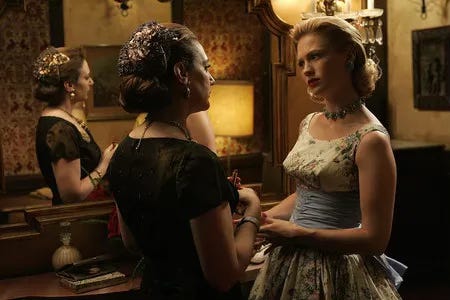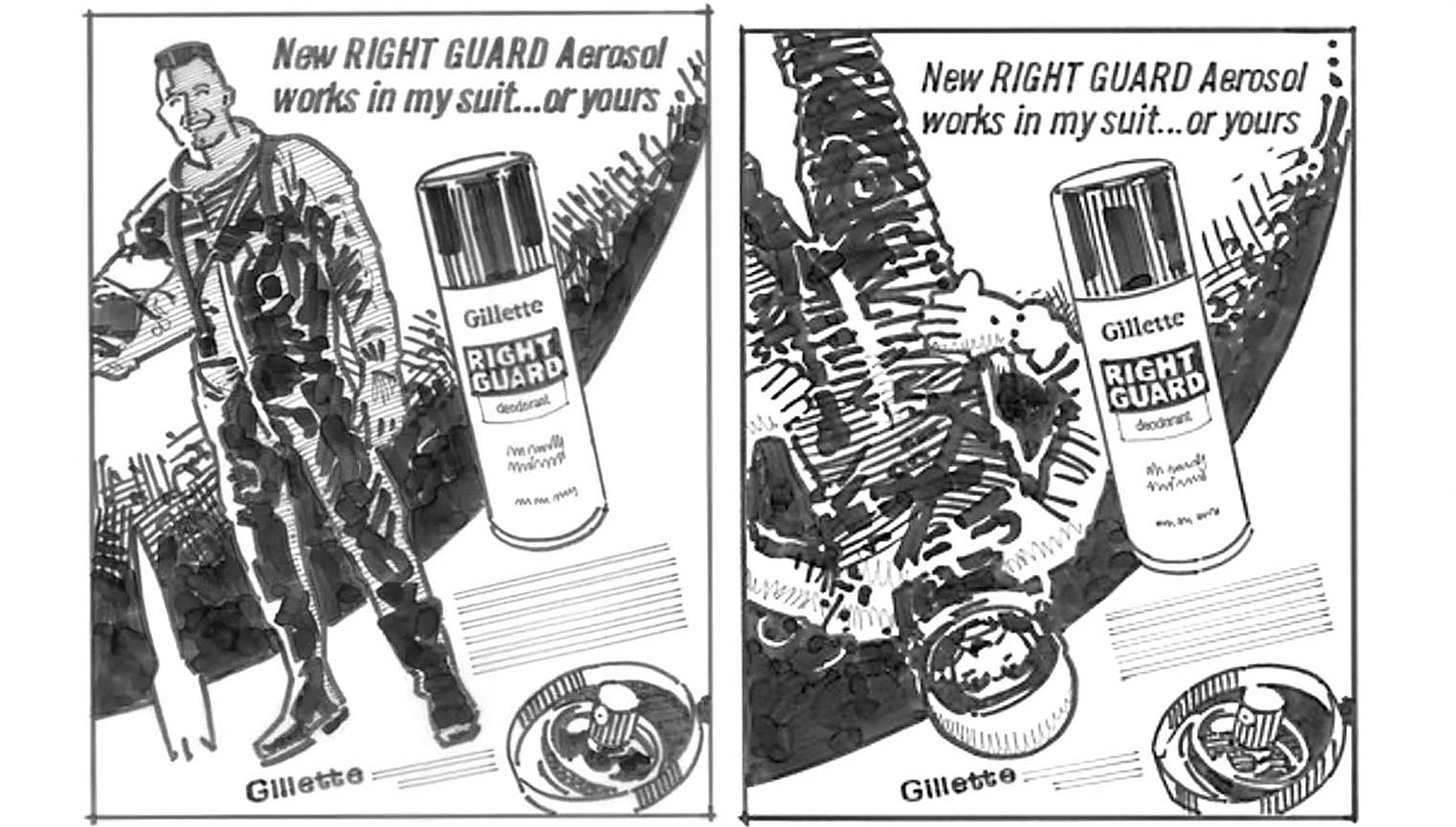The Carousel: "Ladies Room"
The second episode of the show puts the focus squarely on Betty Draper and Peggy Olson.
Clocking in for another day at Sterling-Cooper as I’ll be discussing the second episode in the first season of Mad Men, “Ladies Room.”
The Pitch: “You know what they want? Everything. Especially if the other girls have it.”
We have two characters who find their way into a titular “Ladies Room” in this episode—Betty Draper and Peggy Olson.
Our first scene in the ladies room involves Betty, while she and Don are out at dinner with Roger and Mona Sterling. While in the restroom with Mona, Betty cannot handle her lipstick as her hands have gone numb. I’m always struck in the first season how much of the show feels like it wants to be about Betty as much as it wants to be about Don. This episode revolves around Betty and her nervous condition, specifically with her hands going numb, and how it leads to her going to see a psychiatrist, Dr. Arnold Wayne.
Dr. Wayne, in a clandestine phone call to Don (revealed at the end of the episode), describes Betty as a very nervous young woman and it’s clear that she’s feeling some sense of anxiety.
Where does it come from? The mention of her mother dying just before we enter the scene/the series starts perhaps reflects an awareness that now Betty is this matriarch/maternal figure. Is Betty having trouble accepting that she is that person or does not think she can be that person?
It’s also worth noting that the second time her hands go numb is while she’s driving and she sees the divorced, single mother Helen Bishop (who Betty’s friend Francine Hanson had mentioned/described earlier) unpacking and moving into her home. After this, Betty’s hands go numb and as she’s distracted her car runs into someone’s bird bath on the front lawn and sends Sally and Bobby tumbling.
Thinking back to that moment, after Don had dismissed the idea of seeing a psychiatrist, Betty describes:
I keep thinking... not that I could have killed the kids, but... worse, Sally could have survived, and gone on living with this horrible scar on her face, and some long, lonely, miserable life...
Going on living even with some kind of terrible scar… worrying about a long, lonely, miserable life… the worth that a woman gets is just from how pretty she looks (she notes it would be ok for Bobby to have a scar), I think that’s getting into a core idea (the old wound that will come up in the season 1 finale?). What do we do when we have that scar, even if it’s a metaphorical one?
Also, the fact that seeing Helen is this trigger has always interested me—does Betty fear what Helen represents, or does this idea of the woman liberated from the more traditional bonds excite her in some way?
The other ladies room of the episode is at the Sterling Cooper office where Peggy finds herself twice. The first time, while with Joan, she finds a fellow secretary in there sobbing, trying to comfort her. Throughout this episode, Peggy gets more fully introduced to the world of Sterling Cooper. She’s been on Don’s desk for a couple weeks, but it’s clear she has a lot to learn. At one point, she goes out to lunch with some of junior account men (including Harry Crane, who at the beginning is such a dork). Then, another day, the pretentious Paul Kinsey picks up her lunch from the sandwich cart and then gives her (and us as views) a tour of the office and the different departments that make up the agency.
We also get those men of Sterling Cooper making passes at her, both aggressively as Ken Cosgrove does at a lunch with Peggy, Joan, and some other of the Sterling Cooper guys, and in a more passive way as Paul does when Peggy simply asks if he wants to get lunch. As Peggy wonders, “Why is it that every time a man takes you out to lunch around here, you're... you're the dessert!”
Feeling this frustration (and letting it disrupt her correspondence work, as Joan notes), Peggy retreats into the ladies room where there is someone else crying. But Peggy does not, and instead seemingly steels herself. We’re learning that Peggy is something different.
It’s worth noting that even if they’re doing it in a crude and more forceful way (as Ken does) or as part of the guise of being a friend (as Paul does), they’re both ultimately after the same thing. Paul’s gestures towards some kind of enlightenment or something are always so funny and also come off as so transparently fake (this will pop up again at the beginning of Season 2).
Traffic: “I can never get used to the fact that most of the time it looks like you're doing nothing.”
We still don’t know that much about Don (at dinner, as Betty observes, he’s withholding with Roger about who he is/where he comes from). Describing Don, Roger says “an ad man who doesn’t like to talk about himself, I think I may cry.” But I think we get some interesting insights in the work on the Right Guard product at Sterling Cooper.
Paul’s copy, which plays up the more modern “space age,” does not really resonate with Don. Don’s subdued anger? antipathy?… I don’t know what, but between his dismissing of that approach and how it clearly bugs him that Midge has a television in her apartment, there’s something about that future/better living through technology approach that doesn’t sit right with Mr. Draper
As part of this and thinking about how to sell this product, you get Don trying to find the answer “what do women want”? As he says, that’s how they’re going to sell Right Guard (either a man’s girlfriend or mother is going to want to buy it for them). Don ponders that question with his creative team, with Roger, and his mistress Midge.
He eventually comes, after *extreme euphemism* “spending time” with Midge at her apartment in Greenwich Village, to the realization that the answer is “any excuse to get closer.”
Perhaps not surprisingly, Don is dismissive that what Betty needs is a psychiatrist. At one point, he says to her that people see psychiatrists when they’re unhappy and then intimates that because of what Betty has (family, home/material possessions), that she shouldn’t be unhappy. This comes up again when talking about psychiatrists with Roger in his office (at that dinner, Roger brought up that his daughter was seeing a psychiatrist), and he says “Who could not be happy with all this?”
First-season Don is struggling so much with the image he’s created (we don’t know yet that he’s really Dick Whitman and that Don Draper is a creation) and that the material is what determines happiness. But you can see him brushing up against it, as he says to Midge, "I can't decide... if you have everything... or nothing” to which she responds “I live in the moment. Nothing is everything." More on all this later.
Sterling’s Gold
I’ve decide that, because Roger Sterling has so many hilarious lines throughout the series that they’ll need their own space/category to be recognized. Some of the stars from this episode include:
“You know what? I am very comfortable with my mind. Thoughts clean and unclean, loving and… the opposite of that.”
Don: “We had one headshrinker in the army. A gossip, busting with other people's thoughts.”
Roger: “Hasn't changed much, just costs more.”
Don: “And you can't shoot at them.”
Roger: “We live in troubling times.”
(on Pete Campbell’s choice of honeymoon location): “Niagara Falls. Boy redefines lack of imagination.”
The Jukebox
We get one of the very few truly anachronistic music choices in this show with the Cardigans’ “Great Divide” tagging the end of the episode.
I don’t love the choice, but I think these lyrics certainly have a resonance:
There's a monster growing in our heads
Raised up on the wicked things we've said
A great divide between us now
Something we should know
The Five-Thirty-Eight
Pete doesn’t appear in this episode—he’s on his honeymoon with Trudy, but you feel his presence in the absence in Peggy, the way she fixates on the postcard he sent everyone.
We also get our first appearance of Francice Hanson, Betty’s good friend and neighbor who will appear throughout the series, as well as the first awake appearances of Sally and Bobby Draper. It will be one of many Bobby’s but there is only one Sally in Kiernan Shipka.
Another big first appearance—Robert Morse makes is first appearance in the socks of Bert Cooper. Cooper, along with Sterling, make it clear that they will do what they can to support Nixon in the 1960 campaign. There’s also an allusion of the “Checkers” speech Nixon gave in 1952 as being the model for how his presidential campaign will run (as Don described it: “An admission wrapped in a distraction. I'd say they know what they're doing”).
An admittedly great line by Paul Kinsey: “Don't think that just because he's good-looking, he's not a writer.”
And… one of the funniest Mad Men lines to take out of context:







